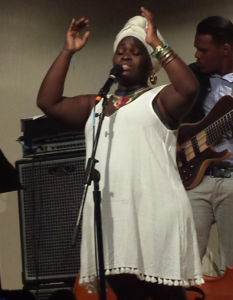 DAYME AROCENA SINGING ‘MAMBO NA’MA’ CHOSEN BETWEEN THE BEST SONGS OF THE CENTURY.
DAYME AROCENA SINGING ‘MAMBO NA’MA’ CHOSEN BETWEEN THE BEST SONGS OF THE CENTURY.
Daymé Arocena is an award-winning Afro-Cuban jazz singer born in Habana on April 15, 1992 and who has been described as the “best female singer in Cuba”.
The song Mambo na’má, by Cuban singer Daymé Arocena, has been chosen by NPR Music – a project of the North American organization National Public Radio – as one of the 200 best songs of the 21st century written by women +. The theme occupies exactly the 167 place in a list in which singers of provenance and very different sonorities appear.
In the note that accompanies the selection, Daymé Arocena is described as a “brilliant Afro-Cuban composer and jazz singer” who “has an extraordinary gift for the construction of the world”. And it is added that “he makes a mockery of the mix of horns, electronic and mambo rhythms and key to create both a tribute and a sound with a vision of the future and described as the mixture of Celia Cruz and Aretha Franklin”.
He also alludes to the fact that the song “happily proves the psychic and sonic connection between the traditions of the 50’s mambo and the bronze sounds of the second line of New Orleans”.
Mambo Na ‘Má is part of the singer’s second album, Cubafonía (2017), which has taken her on a tour of Europe and the United States.
Daymé Arocena has shared the news on her social networks and thanked NPR Music for the inclusion in position 167, where they also meet, among other performers Adele, Beyoncé, Amy Winehouse, Concha Buika and Amara La Negra.
The list of 200 songs is part of the Turning the Tables project, organized by the NPR Music platform, in which more than 70 women have chosen themes that rewrite the canon of popular music towards more inclusive forms. For that reason, the themes are of artists whose musical contributions were produced after January 1 of the year 2000 and have managed to transform the music.
The selection does not include only women, but the project recognizes a broader spectrum of gender identities, hence the “+” sign that is used.
 DAYME AROCENA INTERPRETANDO ‘MAMBO NA’MA’ ESCOGIDA ENTRE LAS MEJORES CANCIONES DEL SIGLO.
DAYME AROCENA INTERPRETANDO ‘MAMBO NA’MA’ ESCOGIDA ENTRE LAS MEJORES CANCIONES DEL SIGLO.
Daymé Arocena Es una galardonada cantante afrocubana de jazz nacida en la Habana el 15 de abril de 1992 y quien ha sido descrita como la “mejor cantante femenina de Cuba”.
El tema Mambo na’má, de la cantante cubana Daymé Arocena, ha sido escogida por NPR Music ―un proyecto de la organización norteamericana National Public Radio― como una de las 200 mejores canciones del siglo XXI escritas por mujeres+. El tema ocupa exactamente el lugar 167 de un listado en el que aparecen cantantes de procedencia y sonoridades muy diferentes.
En la nota que acompaña la selección, se califica a Daymé Arocena de “brillante compositora afrocubana y cantante de jazz” que “posee un don extraordinario para la construcción del mundo”. Y se añade que “se burla a la perfección de la mezcla de cuernos, electrónica y ritmos mambo y clave para crear tanto un homenaje como un sonido con visión de futuro y descrita como la mezcla de Celia Cruz y Aretha Franklin”.
Alude, igualmente, a que la canción “prueba alegremente la conexión psíquica y sónica entre las tradiciones del mambo de los años 50 y los sonidos de bronce de la segunda línea de New Orleans”.
Mambo Na ‘Má forma parte del segundo disco de la cantante, Cubafonía (2017), que la ha llevado de gira por Europa y Estados Unidos.
Daymé Arocena ha compartido la noticia en sus redes sociales y ha agradecido a NPR Music la inclusión en la posición 167, donde también se encuentran, entre otras intérpretes Adele, Beyoncé, Amy Winehouse, Concha Buika y Amara La Negra.
El listado de 200 canciones forma parte del proyecto Turning the Tables, organizado por la plataforma NPR Music, en el cual más de 70 mujeres han escogido temas que reescriban el canon de la música popular hacia formas más inclusivas. Por ese motivo, los temas son de artistas cuyas contribuciones musicales se produjeron después del 1 de enero del año 2000 y han logrado transformar la música.
La selección no incluye solo mujeres, sino que el proyecto reconoce un espectro más amplio de identidades de género, de ahí el signo de “+” que se utiliza.
Agencies/ Cibercuba/ Internet Photos/ YoTube/ Arnoldo Varona/ TheCubanHistory.com
THE CUBAN HISTORY, HOLLYWOOD.






